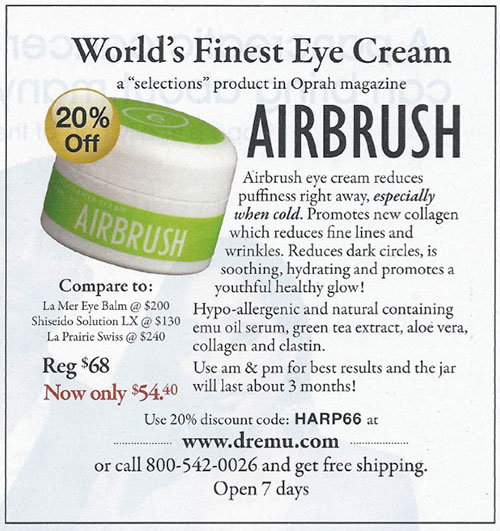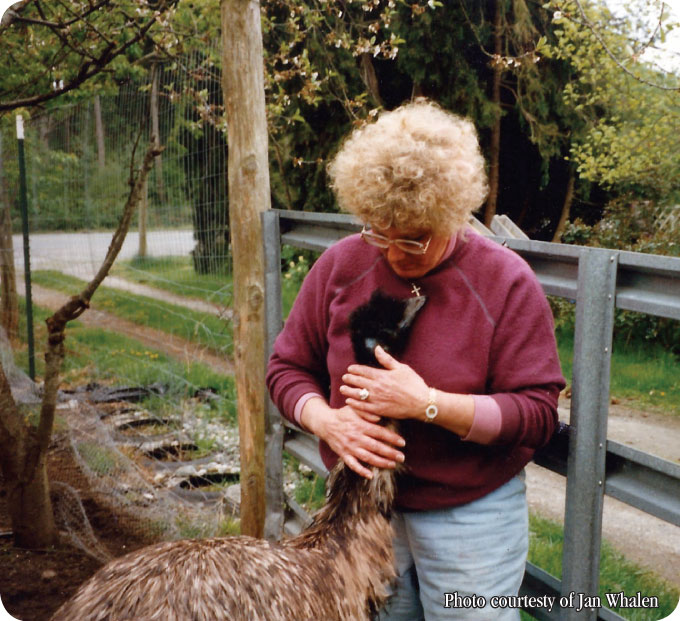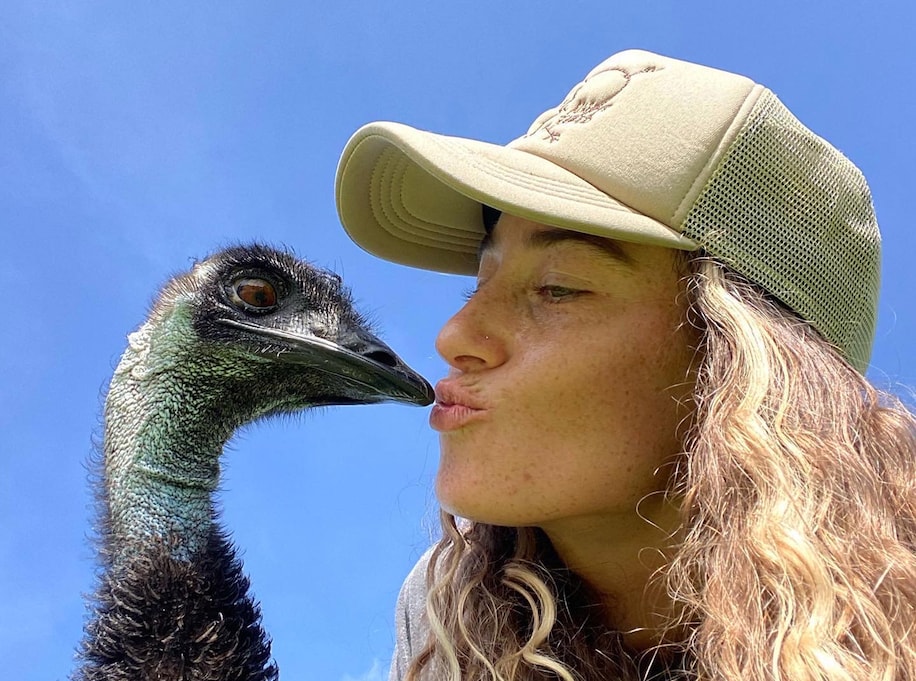Urge Harper’s Magazine to Remove Emu-Oil Cosmetic Advertisement
Emu oil is obtained by slaughtering an emu. There is no other way to get this oil which is touted by emu exploiters as a virtual cure-all for whatever ails you (except as a balm for the sin-sick soul which wearing this oil can only make sicker). Put a glow on your face by smearing slaughtered emu oil on your nose, lips, and cheeks. Soothe and smooth your body with it. Just make sure before purchasing those dainty bottles and tubes of this murdered emu “wellness” ointment that it is “sustainably, ethically sourced.”
On June 2, 2022, I wrote a letter (see below) to the president and publisher of Harper’s Magazine, John MacArthur, urging him to discontinue an ad for a cosmetic skin cream called Airbrush. This cream is made of emu oil, extracted from the thick layer of fat beneath the emu’s skin, a reserve for hard times in the bird’s native Australia where this fleet-footed, flightless, gentle nomad evolved 90 million years ago.
Concluding an email correspondence with Mr. MacArthur’s assistant, Virginia Navarro, I received the following email from Ms. Navarro on July 12, 2022:
Dear Dr. Davis,
After much internal discussion and consideration, Mr. MacArthur concluded that we must honor our existing contracts and will continue working with this advertiser. We understand not every reader will approve of every advertisement that appears in Harper’s Magazine, but we will leave it to them to make their own purchasing choices. We will not be publishing your letter in the magazine, as our “Letters” section is reserved for comment on editorial features and not on advertising.
We respect your concerns and we sincerely appreciate your many years as a subscriber, and we hope you will continue to read Harper’s Magazine.

What Can I Do?
Protest Politely But Firmly:
Please remove this cruel advertisement!
Contact customer service at [email protected] or 1-800-444-4653.
June 2, 2022
John R. MacArthur, President and Publisher
Harper’s Magazine
666 Broadway, 11th Floor
New York, NY 10012
Dear Mr. MacArthur:
I am a decades-long, devoted reader of Harper’s Magazine.
I am writing to you now about an advertisement that Harper’s has been running for a year or more, for a product called Airbrush. This product contains emu oil, which is obtained by raising and slaughtering emus. I respectfully ask you please to stop running this ad promoting slaughterhouse emu oil.
I understand that most people are not familiar with emus other than as a demeaning cartoon character, which has nothing to do with actual emus, who, with ostriches, belong to the oldest living family of birds on earth, the ratites, or nomadic flightless fowl.
I do not wish to overwhelm you and Harper’s with material about emus, although I am prepared to do so if the Airbrush ad continues to appear in Harper’s Magazine. With this in mind, I’m enclosing two copies of our brochures about ostriches and emus entitled Nowhere To Hide.
I also respectfully refer you to our webpage on ostriches and emus at www.upc-online.org/ostriches. I urge you to read about these birds, their natural dignity, their strong family life, their amazing fleetness, and the horror of the slaughter to which they are subjected for their body parts. The high standards of Harper’s Magazine are incompatible with the brutality of the product, fittingly called “Airbrush,” since anyone who does not understand the source and meaning of emu oil is undergoing an airbrush.
I would appreciate receiving a response from you to my letter, and I hope for good news.
That said, thank you very much for your attention. Please do not hesitate to contact me for more information. I look forward to hearing from you.
Sincerely,
Karen Davis, PhD, President United Poultry Concerns

Jan Whalen and Bluie the Emu in Everett, Washington
READ “We have a lot to learn from emus,” by Pattrice Jones, Vine Sanctuary, The Washington Post, July 22, 2022

Taylor Blake and Emmanuel the emu. (Courtesy of Taylor Blake)
Regarding the July 20 Style article “Emmanuel the emu may not care about his celebrity. But the internet does.”:
Emus are feathered dinosaurs that have existed in their present form for at least 2 million years. In contrast, anatomically modern humans have existed for only about 160,000 years. Emus have survived two brushes with extinction because of humans and are currently confronting the existential threat of climate change. Probably, they will survive us. Certainly, their collective dignity is undiminished by human mockery, despite the antics of humans who laugh at the frantic behavior of traumatized captives such as Emmanuel and the emus misused by Liberty Mutual for its commercials.
We could learn a lot from emus, whose flexibility, persistence and cooperative culture have helped them to flourish despite changing circumstances, including a war in which Australian farmers used machine guns to try to drive them from their homelands. To this day, they have not ceded those lands. Nor have they consented to be held perpetually captive and forcibly bred for human amusement and profit. Their captors cannot speak for them.
Before it’s too late, let’s respect and learn from emus and other nonhuman elders who may know things about the world that we cannot yet see. Let’s have empathy, too, and release the captives to sanctuaries or the wild.
Pattrice Jones, Springfield, Vt.
The writer is coordinator of VINE Sanctuary, a multispecies community that includes emus.
Thank You for Taking Action for Emus!
Don't just switch from beef to chicken. Go Vegan.
www.UPC-online.org


